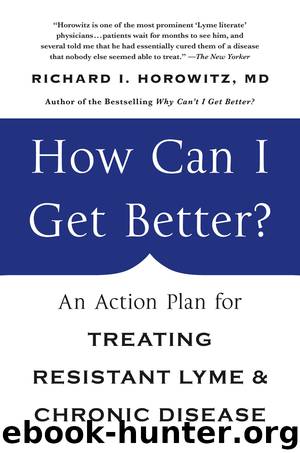How Can I Get Better? by Richard Horowitz

Author:Richard Horowitz
Language: eng
Format: epub
Publisher: St. Martin's Press
HORMONE REPLACEMENT THERAPIES FOR MEN
Treatment resistance can also occur in some patients because of low levels of sex hormones. My view of hormone replacement has changed radically over the years as I have learned more about hormone replacement therapy from colleagues at major medical centers, and as new studies have emerged. For example, we learned in medical school that testosterone can cause prostate cancer, yet a study of one-quarter-million medical records of white men, presented at the annual meeting of the American Urological Association in San Diego, California, May 2016, showed that testosterone therapy does not raise the risk of aggressive prostate cancer, and that it improved sexual functioning and mood. The science is continuously changing, yet there are conflicting results in different groups of men regarding the safety and health benefits of testosterone. At the 2012 Integrative Healthcare Symposium conference in New York City, at which I was a speaker, I learned about the importance of hormone levels for adult health and the cardiovascular benefits of testosterone. In an article published in 2006 in the Archives of Internal Medicine, mortality levels were 88 percent higher in men with low testosterone (“low T”) compared to men who had normal levels of testosterone. Low testosterone contributes to degenerative diseases of aging that involve chronic inflammation, and testosterone is cardio-protective. Men who receive testosterone replacement therapy have a slower progression from metabolic syndrome to diabetes or cardiovascular disease. This is because testosterone increases insulin sensitivity and helps to regulate blood pressure and lipid levels in the body. Declining levels of testosterone are also linked to rises in markers of inflammation, such as C-reactive protein (CRP). This elevated level of CRP is due to low levels of testosterone that, in conjunction with other stress hormones (epinephrine and cortisol), alter protein synthesis in the liver, increasing the production of inflammatory cytokines. Abdominal obesity, which results from testosterone deficiency, actually pumps out increasing levels of inflammatory cytokines, which is one of the reasons why low testosterone has been shown directly, in multiple scientific studies, to increase the risk for atherosclerosis. Yet in two other recently published studies, men with a history of cardiovascular disease treated with testosterone were significantly more likely to have a heart attack in the first ninety days after starting the medication, and another study found testosterone therapy in older men was linked with an increased risk for death, myocardial infarction, or ischemic stroke. How can we make sense of these seemingly conflicting results?
There are multiple cardiovascular risk factors that can affect overall mortality, which were not controlled for in all studies. For example, when pregnenolone and DHEA sulfate (DHEA-S) levels drop with age, we see an increase in cardiovascular mortality. Pregnenolone is the precursor to DHEA production in the body, which subsequently is converted into androstenedione and then into testosterone. Chronic stress can initiate a “pregnenolone steal,” which is when the body begins to make more cortisol from pregnenolone instead of making sex hormones, thereby lowering DHEA and sex hormone levels.
Download
This site does not store any files on its server. We only index and link to content provided by other sites. Please contact the content providers to delete copyright contents if any and email us, we'll remove relevant links or contents immediately.
Periodization Training for Sports by Tudor Bompa(8240)
Why We Sleep: Unlocking the Power of Sleep and Dreams by Matthew Walker(6686)
Paper Towns by Green John(5167)
The Immortal Life of Henrietta Lacks by Rebecca Skloot(4567)
The Sports Rules Book by Human Kinetics(4371)
Dynamic Alignment Through Imagery by Eric Franklin(4200)
ACSM's Complete Guide to Fitness & Health by ACSM(4043)
Kaplan MCAT Organic Chemistry Review: Created for MCAT 2015 (Kaplan Test Prep) by Kaplan(3994)
Livewired by David Eagleman(3757)
Introduction to Kinesiology by Shirl J. Hoffman(3753)
The Death of the Heart by Elizabeth Bowen(3596)
The River of Consciousness by Oliver Sacks(3590)
Alchemy and Alchemists by C. J. S. Thompson(3505)
Bad Pharma by Ben Goldacre(3414)
Descartes' Error by Antonio Damasio(3263)
The Emperor of All Maladies: A Biography of Cancer by Siddhartha Mukherjee(3135)
The Gene: An Intimate History by Siddhartha Mukherjee(3086)
The Fate of Rome: Climate, Disease, and the End of an Empire (The Princeton History of the Ancient World) by Kyle Harper(3048)
Kaplan MCAT Behavioral Sciences Review: Created for MCAT 2015 (Kaplan Test Prep) by Kaplan(2973)
